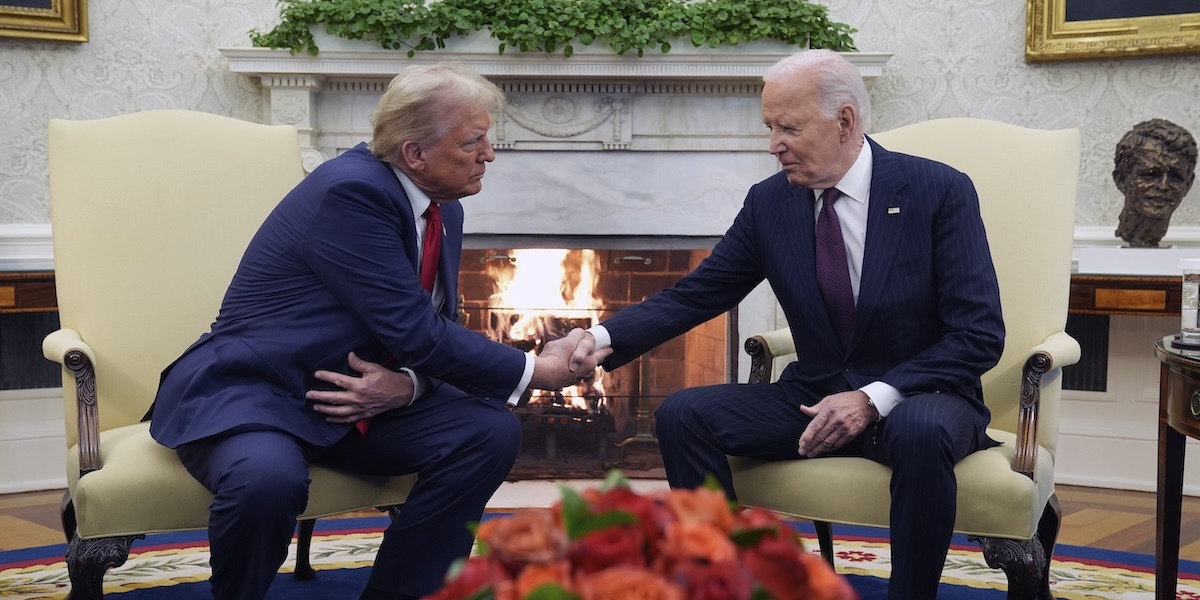On November 13, 2024, U.S. President Joe Biden received President-elect Donald Trump at the White House, marking the formal start of the power transition process. This meeting represents a return to the American institutional tradition that was broken four years ago when Donald Trump did not welcome Joe Biden following his election victory. His wife Melania declined an invitation to the symbolic and institutional meeting at the Oval Office, which was the setting for an exchange of formality and intent between the two leaders. Biden welcomed Trump with words of congratulation, “Welcome president-elect, Donald,” reaffirming the importance of ensuring a peaceful and orderly transition. Trump, for his part, assured that the transition of power will be “as smooth as possible,” stressing the need for stability at a delicate time for the country.
During the meeting, the two leaders discussed crucial issues, including foreign policy and international crisis management. Central to the dialogue was the conflict in Ukraine. Biden reiterated the U.S. commitment to support Kiev against Russian aggression, declaring, “We cannot allow Ukraine to be left in Putin’s hands.” Trump, on the other hand, promised to end the conflict quickly, although he has not yet provided concrete details on his plan.
A historic moment for American democracy: a meeting, albeit cordial, that represented more than a mere formality. It is a strong signal of respect for democratic institutions and the American tradition of ensuring continuity of power. Biden, in the course of the discussion, stressed the importance and his desire for an orderly transition process for the stability of the country. Trump, in turn, acknowledged the efforts of the outgoing administration in facilitating this transition. This institutional dialogue marks a moment of symbolic reconciliation after years of confrontation and high tensions, reaffirming the importance of preserving democratic traditions in an era of political divisions.
The transition process will culminate with Donald Trump’s official inauguration on January 20, 2025, when he takes office again as president of the United States. This event will mark the beginning of a new phase for the country, with immense challenges to be faced both domestically and internationally.
First and foremost is the cabinet team that is making waves and will join him during his second term in the White House. The appointments announced so far reflect a combination of political loyalty and expertise in several key areas.
The most talked about: Robert Kennedy Jr. at health care, branded in the press as a “no vax” has already inflamed tempers over concerns of possible negative action against health security, while the intent is exactly the opposite, and is to ensure a good lifestyle and health through “food” and sports, and Elon Mask, a genius and innovative entrepreneur who has already spoken out in strong tones on urban and environmental redevelopment. But not only that. Elon Musk’s recent expressions about Italian judges and their role in handling migration issues have raised complex questions about the relationship between freedom of expression, national sovereignty, and respect for a country’s institutions. Musk’s phrase, “These judges must go away,” uttered in the sensitive context of migration, inevitably generated a strong reaction from both Italian institutions and public opinion.
Musk, with his global influence and his X platform (formerly Twitter), undoubtedly represents a figure capable of influencing opinions on a planetary level.
Criticism is essential for improvement, but it seems to have inconvenienced internationally prominent personalities such as Musk, a future member of the government, to express an opinion. Opinion, moreover, related to the territory where he lives, not taking into account different realities such as Italy.
Unexpectedly, the Italian response came: President Sergio Mattarella, the guardian of the country’s neutrality and institutional balance, chose to respond with a gesture that surprised many: a direct message to Musk, but deliberately circumscribed to an unofficial sphere. An unusual move for a head of state, who preferred not to involve the usual diplomatic channels or the Prime Minister’s Office.
The episode raises questions about how the boundaries between politics, economics and diplomacy are becoming increasingly fluid.
Perhaps Elon Musk’s words, although uncomfortable, and linked to the notion that everything can be movable in America, not taking into account that Italy is exactly the opposite, represent just what the Italian system needs: an external jolt to reflect on judicial mechanisms that often appear slow, incomprehensible or distant from the real needs of society. In an increasingly interconnected world, where national borders blur in the face of global challenges such as migration, figures like Musk remind us that no institution is untouchable and that progress comes from the ability to accept criticism, even the harshest and most direct.
The press in all this elevates itself as judge and provocateur, and the headlines are wasted.
In short, we are going to see some good things.
The article Trump, Biden, Musk and the role of Italy: between geopolitics and private comes from TheNewyorker.

